Switzerland in the Eurovision Song Contest
Switzerland has participated in the Eurovision Song Contest 63 times since making its debut at the first contest in 1956, missing only four contests, in 1995, 1999, 2001 and 2003. Switzerland hosted the first contest in 1956 in Lugano, and won it. Switzerland won the contest again in 1988, with the 1989 contest being held in Lausanne.
| Switzerland in the Eurovision Song Contest | |
|---|---|
.svg.png.webp)
| |
| Participating broadcaster | Swiss Broadcasting Corporation (SRG SSR) |
| Participation summary | |
| Appearances | 63 (52 finals) |
| First appearance | 1956 |
| Highest placement | 1st: 1956, 1988 |
| Host | 1956, 1989 |
| External links | |
| Switzerland's page at Eurovision.tv | |
Switzerland in the Eurovision Song Contest 2023 | |
Lys Assia won the first contest in 1956 with the song "Refrain". She returned to place second in 1958. Switzerland would go on to finish second with Esther Ofarim (1963) and Daniela Simmons (1986) and third with Franca di Rienzo (1961) and Arlette Zola (1982), before winning the contest for the second time in 1988 with Celine Dion and the song "Ne partez pas sans moi". Annie Cotton gave the country its 15th top five result in 1993, when she placed third.
Since the introduction of the qualifying round in 1993, Switzerland has entered the top ten only four times. Since the introduction of the semi-final round in 2004, Switzerland have failed to reach the final in 11 of 19 contests, including finishing in last place in the semi-final on 4 occasions. Switzerland returned to the top five for the first time in 26 years when Luca Hänni gave the country its 16th top five result by finishing fourth in 2019, followed by its 17th top five finish, when Gjon's Tears placed third in 2021. It has also finished in last place in the semi-finals four times since their introduction in 2004, with Piero and the MusicStars (2004), Michael von der Heide (2010), Mélanie René (2015) and Rykka (2016).
Absences
Switzerland had been absent from Eurovision four times since their participation began in the first contest. These absences, in 1995, 1999, 2001 and 2003 were caused by poor results in previous contests that led to relegation.[1][2][3][4]
National selections
A mix of different selection processes have been used to determine Switzerland's entry in each year's contest. Since 2019, SRG SSR has used an internal selection process, although televised national finals were used in previous years, held under various names including Concours Eurovision from the 1950s to 2000s, and Die Grosse Entscheidungsshow between 2011 and 2018. In the 1980s, the Swiss national finals tended to have ten participating songs each year: three in French, three in German, three in Italian and one in Romansch.
Participation overview
Switzerland has four official languages, French, German, Italian, and Romansh. For decades, the song requirements stated that the song had to be performed in a national language, which gave Switzerland leeway as they could perform in any of the four languages. Out of their 60 appearances in the contest, Switzerland has sent 61 songs, 24 of which were in French, 12 in German, 15 in English, 10 in Italian and 1 in Romansh. Both of Switzerland's winning songs have been sung in French.
| 1 | First place |
| 2 | Second place |
| 3 | Third place |
| ◁ | Last place |
| X | Entry selected but did not compete |
| † | Upcoming event |
Congratulations: 50 Years of the Eurovision Song Contest
| Artist | Song | Language | At Congratulations | At Eurovision | |||||
|---|---|---|---|---|---|---|---|---|---|
| Final | Points | Semi | Points | Year | Place | Points | |||
| Céline Dion | "Ne partez pas sans moi" | French | Failed to qualify | 10 | 98 | 1988 | 1 | 137 | |
Hostings
| Year | Location | Venue | Presenter(s) |
|---|---|---|---|
| 1956 | Lugano | Teatro Kursaal | Lohengrin Filipello |
| 1989 | Lausanne | Palais de Beaulieu | Lolita Morena and Jacques Deschenaux |
Awards
Marcel Bezençon Awards
| Year | Category | Song | Composer(s) lyrics (l) / music (m) |
Performer | Final | Points | Host city | Ref. |
|---|---|---|---|---|---|---|---|---|
| 2021 | Composer Award | "Tout l'univers" | Gjon Muharremaj, Xavier Michel, Wouter Hardy & Nina Sampermans (m & l) | Gjon's Tears | 3 | 432 |
Related involvement
Conductors
| Year | Conductor[lower-alpha 5] | Musical Director | Notes | Ref. |
|---|---|---|---|---|
| 1956 | Fernando Paggi | [lower-alpha 6] | [7] | |
| 1957 | N/A | [lower-alpha 7] | ||
| 1958 | Paul Burkhard | |||
| 1959 | [lower-alpha 8] | |||
| 1960 | Cédric Dumont | |||
| 1961 | Fernando Paggi | |||
| 1962 | Cédric Dumont | |||
| 1963 | [lower-alpha 9] | |||
| 1964 | Fernando Paggi | |||
| 1965 | Mario Robbiani | |||
| 1966 | [lower-alpha 10] | |||
| 1967 | Hans Moeckel | |||
| 1968 | Mario Robbiani | |||
| 1969 | ||||
| 1970 | [8] | |||
| 1971 | Hardy Schneiders | |||
| 1972 | ||||
| 1973 | ||||
| 1974 | ||||
| 1975 | Peter Jacques | |||
| 1976 | Mario Robbiani | |||
| 1977 | Peter Jacques | |||
| 1978 | ||||
| 1979 | ||||
| 1980 | Peter Reber | [9] | ||
| 1981 | ||||
| 1982 | ||||
| 1983 | Robert Weber | [lower-alpha 11] | ||
| 1984 | Mario Robbiani | |||
| 1985 | Anita Kerr | |||
| 1986 | ||||
| 1987 | No conductor | |||
| 1988 | ||||
| 1989 | [lower-alpha 12] | |||
| 1990 | Bela Balint | N/A | ||
| 1991 | ||||
| 1992 | Roby Seidel | |||
| 1993 | Marc Sorrentino | |||
| 1994 | ||||
| 1996 | ||||
| 1997 | ||||
| 1998 | No conductor | |||
Commentators and spokespersons
Over the years Switzerland has broadcast the Eurovision Song Contest on three television stations, SRF (German language), RTS (French language) and RSI (Italian language).
| Year | Commentator | Spokesperson | Ref. | ||
|---|---|---|---|---|---|
| SRF | RTS | RSI | |||
| 1956 | Fritz Schäuffele[10] | Robert Burnier | No broadcast | No spokesperson | |
| 1957 | No broadcast | Commentary via RTF France | Mäni Weber | ||
| 1958 | Theodor Haller | ||||
| 1959 | Boris Acquadro | ||||
| 1960 | |||||
| 1961 | |||||
| 1962 | Commentary via RAI Italy | Alexandre Burger | |||
| 1963 | Georges Hardy | ||||
| 1964 | Robert Burnier | ||||
| 1965 | Jean Charles | ||||
| 1966 | Georges Hardy | Giovanni Bertini | |||
| 1967 | Robert Burnier | ||||
| 1968 | Georges Hardy | ||||
| 1969 | |||||
| 1970 | |||||
| 1971 | No spokesperson | ||||
| 1972 | |||||
| 1973 | |||||
| 1974 | Michel Stocker | ||||
| 1975 | |||||
| 1976 | |||||
| 1977 | |||||
| 1978 | |||||
| 1979 | Max Rüeger | ||||
| 1980 | Theodor Haller | ||||
| 1981 | |||||
| 1982 | |||||
| 1983 | |||||
| 1984 | Bernard Thurnheer | Serge Moisson | Ezio Guidi | ||
| 1985 | |||||
| 1986 | |||||
| 1987 | Wilma Gilardi | ||||
| 1988 | Ezio Guidi | ||||
| 1989 | Thierry Masselot | Giovanni Bertini | |||
| 1990 | Emanuela Gaggini | ||||
| 1991 | Lolita Morena | ||||
| 1992 | Mariano Tschuor | Ivan Frésard | |||
| 1993 | Bernard Thurnheer | Jean-Marc Richard | |||
| 1994 | Wilma Gilardi | Sandra Studer | |||
| 1995 | Heinz Margot | Joanne Holder | Did not participate | ||
| 1996 | Sandra Studer | Pierre Grandjean | Yves Ménestrier | ||
| 1997 | Heinz Margot, Roman Kilchsperger | Jonathan Tedesco | Sandy Altermatt | ||
| 1998 | Jean-Marc Richard | Regula Elsener | |||
| 1999 | Sandra Studer | Did not participate | |||
| 2000 | Astrid Von Stockar | ||||
| 2001 | Phil Mundwiller | Did not participate | |||
| 2002 | Jonathan Tedesco, Claudio Lazzarino | Diana Jörg | |||
| 2003 | Roman Kilchsperger | Jean-Marc Richard, Alain Morisod | Daniele Rauseo, Claudio Lazzarino | Did not participate | |
| 2004 | Marco Fritsche | Daniela Tami, Claudio Lazzarino | Emel Aykanat | ||
| 2005 | Sandra Studer | Jean-Marc Richard, Marie-Thérèse Porchet | Cécile Bähler | ||
| 2006 | Jean-Marc Richard, Alain Morisod | Sandy Altermatt, Claudio Lazzarino | Jubaira Bachmann | ||
| 2007 | Bernard Thurnheer | Jean-Marc Richard (all), Henri Dès (final), Nicolas Tanner (semi-final) | Sven Epiney | ||
| 2008 | Sven Epiney | Jean-Marc Richard, Nicolas Tanner | Sandy Altermatt | Cécile Bähler | |
| 2009 | |||||
| 2010 | Christa Rigozzi | ||||
| 2011 | Jonathan Tedesco | Cécile Bähler | |||
| 2012 | Clarissa Tami, Paolo Meneguzzi | Sara Hildebrand | |||
| 2013 | Alessandro Bertoglio | Mélanie Freymond | |||
| 2014 | Sven Epiney, Peter Schneider, Gabriel Vetter | Alessandro Bertoglio, Sandy Altermatt | Kurt Aeschbacher | ||
| 2015 | Clarissa Tami, Paolo Meneguzzi | Laetitia Guarino | |||
| 2016 | Clarissa Tami, Michele Carobbio | Sebalter | |||
| 2017 | Sven Epiney (all); Stefan Büsser, Micky Beisenherz (final) | Clarissa Tami (all); Sebalter (final) | Luca Hänni | ||
| 2018 | Sven Epiney | Clarissa Tami, Sebalter | Letícia Carvalho | ||
| 2019 | Jean-Marc Richard, Nicolas Tanner (all); Bastian Baker (final) | Sinplus | |||
| 2021 | Jean-Marc Richard, Nicolas Tanner (all); Joseph Gorgoni (final) | Clarissa Tami (2nd semi-final and final); Sebalter (final) | Angélique Beldner | ||
| 2022 | Jean-Marc Richard (all); Nicolas Tanner (semi-finals) Gjon's Tears (final) | Clarissa Tami (all); Francesca Marigiotta (1st semi-final and final) Boris Piffaretti (2nd semi-final and final) | Julie Berthollet | ||
| 2023 | Jean-Marc Richard, Nicolas Tanner, Priscilla Formaz | Ellis Cavallini and Gian-Andrea Costa | Chiara Dubey | ||
Gallery
 Jean Philippe in Luxembourg (1962)
Jean Philippe in Luxembourg (1962)
%252C_Bestanddeelnr_923-3707.jpg.webp)
%252C_Bestanddeelnr_928-5029.jpg.webp) Peter, Sue and Marc in The Hague (1976)
Peter, Sue and Marc in The Hague (1976)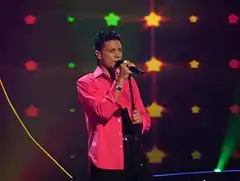 Piero and the MusicStars in Istanbul (2004)
Piero and the MusicStars in Istanbul (2004)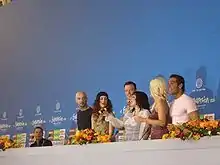

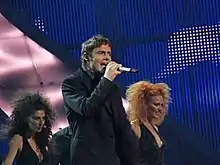 Paolo Meneguzzi in Belgrade (2008)
Paolo Meneguzzi in Belgrade (2008).jpg.webp) Michael von der Heide in Oslo (2010)
Michael von der Heide in Oslo (2010).jpg.webp) Anna Rossinelli in Düsseldorf (2011)
Anna Rossinelli in Düsseldorf (2011)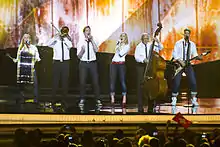
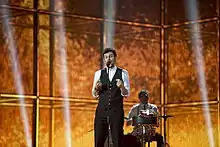
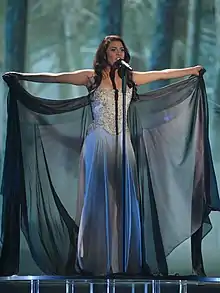 Mélanie René in Vienna (2015)
Mélanie René in Vienna (2015)

.jpg.webp)
.jpg.webp) Luca Hänni in Tel Aviv (2019)
Luca Hänni in Tel Aviv (2019)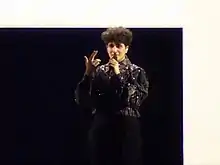 Gjon's Tears in Rotterdam (2021)
Gjon's Tears in Rotterdam (2021) Marius Bear in Turin (2022)
Marius Bear in Turin (2022).jpg.webp) Remo Forrer in Liverpool (2023)
Remo Forrer in Liverpool (2023)
See also
- Switzerland in the Junior Eurovision Song Contest – Junior version of the Eurovision Song Contest.
- Switzerland in the Eurovision Dance Contest – Dance version of the Eurovision Song Contest.
- Switzerland in the Eurovision Young Dancers – A competition organised by the EBU for younger dancers aged between 16 and 21.
- Switzerland in the Eurovision Young Musicians – A competition organised by the EBU for musicians aged 18 years and younger.
Notes
- The 1956 contest had secret voting and, apart from the winner, no results were released.
- Contains some words in French
- According to the then-Eurovision rules, the top ten non-Big Four countries from the previous year along with the Big Four automatically qualified for the grand final without having to compete in semi-finals. For example, if Germany and France placed inside the top ten, the 11th and 12th spots were advanced to the next year's grand final along with all countries ranked in the top ten.
- The 2020 contest was cancelled due to the COVID-19 pandemic.
- All conductors are of Swiss nationality unless otherwise noted.
- Also conducted the Dutch and German entries.
- Host conductor
- Host conductor
- Host conductor
- Host conductor
- Conducted at the national final by Hans Moeckel
- Also conducted the Luxembourgish entry and half of the Danish entry.
References
- "History by Year: Eurovision Song Contest 1995". EBU. Archived from the original on 2010-12-31. Retrieved 2009-04-15.
- "History by Year: Eurovision Song Contest 1999". EBU. Archived from the original on 2010-12-31. Retrieved 2009-04-15.
- "History by Year: Eurovision Song Contest 2001". EBU. Archived from the original on 2011-06-05. Retrieved 2009-04-15.
- "History by Year: Eurovision Song Contest 2003". EBU. Archived from the original on 2011-06-05. Retrieved 2009-04-15.
- Gannon, Rory (7 July 2023). "Switzerland confirms Eurovision 2024 participation". That Eurovision Site. Retrieved 8 July 2023.
- "The Marcel Bezençon Award". 22 May 2021.
- Roxburgh, Gordon (2012). Songs for Europe: The United Kingdom at the Eurovision Song Contest. Vol. One: The 1950s and 1960s. Prestatyn: Telos Publishing. pp. 93–101. ISBN 978-1-84583-065-6.
- Roxburgh, Gordon (2014). Songs for Europe: The United Kingdom at the Eurovision Song Contest. Vol. Two: The 1970s. Prestatyn: Telos Publishing. pp. 142–168. ISBN 978-1-84583-093-9.
- Roxburgh, Gordon (2016). Songs for Europe: The United Kingdom at the Eurovision Song Contest. Vol. Three: The 1980s. Prestatyn: Telos Publishing. ISBN 978-1-84583-118-9.
- "Do. 24. Mai". Bild + Funk (in German). No. 21/1956. 20 May 1956. p. 43. OCLC 643528928.
- ""ESC" 2017: Satirischer Kommentar mit Stefan Büsser und "Aeschbacher Spezial – aus Kiew"" [«ESC» 2017: Satirical commentary with Stefan Büsser and «Aeschbacher Special – from Kyiv»]. SRF (in German). Retrieved 27 February 2020.
- "Eurovision Song Contest 2017". RSI (in Italian). Archived from the original on 7 May 2017. Retrieved 27 February 2017.
- Davies, Megan (1 May 2017). "Switzerland: Luca Hänni Announced As Spokesperson". Eurovoix. Retrieved 27 February 2020.
- Granger, Anthony (16 April 2018). "Switzerland: Sven Epiney Returns to the Commentary Booth". Eurovoix. Retrieved 26 February 2020.
- "Eurosong – TV – Play RTS". RTS (in French). Retrieved 26 February 2020.
- "Eurovision Song Contest 2018 – RSI Radiotelevisione svizzera". RSI (in Italian). 7 May 2018. Retrieved 26 February 2020.
- Granger, Anthony (19 April 2018). "Switzerland: Leticia Carvalho Revealed as Spokesperson". Eurovoix. Retrieved 26 February 2020.
- Granger, Anthony (16 April 2019). "Switzerland: Sven Epiney Confirmed as SRF's Eurovision Commentator". Eurovoix. Retrieved 26 February 2020.
- Brown, Alistair (3 May 2019). "Switzerland: Bastian Baker Announced As Commentator For Grand Final". Eurovoix. Retrieved 26 February 2020.
- "Dal 3 giugno addio al Digitale Terrestre in Svizzera, niente più Eurovision sulla RSI per gli italiani" [Farewell to DTT in Switzerland from 3 June, no more Eurovision on CSR for Italians]. eurofestivalnews.com (in Italian). 6 May 2019. Retrieved 26 February 2020.
- Herbert, Emily (24 April 2019). "Switzerland: Sinplus Revealed as Eurovision 2019 Spokespersons". Eurovoix. Retrieved 26 February 2020.
- "TV-Programm" (in German). Swiss Broadcasting Corporation. Retrieved 2021-05-10.
- "Eurovision 2021: scarica la Guida completa all'evento (anche in versione eBook!)". Eurofestival (in Italian). 10 May 2021. Retrieved 2021-05-11.
- "Programme TV" (in French). Radio Télévision Suisse. Retrieved 2021-05-10.
- Granger, Anthony (2021-04-12). "Switzerland: Sven Epiney Confirmed as SRF's Eurovision 2021 Commentator". Eurovoix. Retrieved 2021-04-12.
- Granger, Anthony (2021-04-27). "Switzerland: Angélique Beldner Revealed as Spokesperson For Eurovision 2021". Eurovoix. Retrieved 2021-04-27.
- "🇨🇭 Switzerland: Eurovision 2022 Commentators for RSI Revealed". 8 May 2022.
- "🇨🇭 Switzerland: Julie Berthollet Spokesperson for Eurovision 2022". 7 May 2022.
- "Sie war 2018 in der Vorauswahl - Chiara Dubey verteilt die ESC-Punkte für die Schweiz". srf.ch (in German). SRF. 2023-04-25. Retrieved 2023-04-26.
- "Remo Forrer mit «Watergun» für die Schweiz am «Eurovision Song Contest» 2023". Medienportal (in German). Retrieved 2023-03-07.
- "ESC 2023 - Svizra prenda part cun «Watergun»". rtr.ch (in Romansh). Radiotelevisiun Svizra Rumantscha. 7 March 2023. Retrieved 2023-03-07.
- "TV-Programm – 09.05.2023". Play SRF (in German). Retrieved 2023-04-05.
- "TV-Programm – 11.05.2023". Play SRF (in German). Retrieved 2023-04-05.
- "TV-Programm – 13.05.2023". Play SRF (in German). Retrieved 2023-04-06.
- Granger, Anthony (2023-04-11). "Switzerland: Sven Epiney Confirmed as SRF's Eurovision 2023 Commentator". Eurovoix. Retrieved 2023-04-11.
- "'Watergun': Remo Forrer fait son entrée dans l'Eurovision avec force". rts.ch (in Swiss French). Radio Télévision Suisse. 7 March 2023. Retrieved 2023-03-07.
- "Eurovision Song Contest 2023 - Remo Forrer in gara per la Svizzera con 'Watergun'". rsi.ch (in Italian). Radiotelevisione svizzera. Retrieved 2023-03-07.
External links
- Points to and from Switzerland eurovisioncovers.co.uk